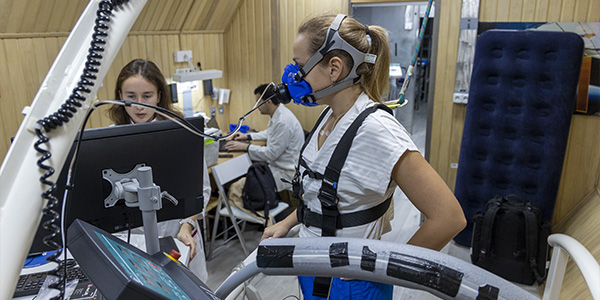Since living through a pandemic, we’ve all recently become acutely aware of the stresses associated with living in close quarters with a single group of people for a prolonged time. Spare a thought, then, for the six men and women who entered the Russian Academy of Science’s SIRIUS-23 project last Tuesday – and won’t come out again for 360 days.
The team – compromising crew commander Yuri Sergeevich Chebotarev, flight engineer Anzhelika Anatolyevna Parfyonova, crew doctor Ksenia Dmitrievna Orlova, and researchers Olga Sergeevna Mastitskaya, Ksenia Sergeevna Shishenina, and Rustam Nazimovich Zaripov – will spend the next almost-year in a sealed-off facility at the Institute for Biomedical Problems (IBMP) in Moscow.
It’s the fourth mission launched in the SIRIUS project – the name stands for “Scientific International Research In Unique terrestrial Station” – a joint endeavor from NASA and IBMP. As in previous experiments, the crew will nominally be on a simulated lunar mission: performing a flyby, multiple “landings” and surface operations, using a rover for investigations, and so on.
But diverting though that all is, it’s not the main goal of the mission. “The research is not about exploring the lunar surface,” NASA announced at the start of 2019’s SIRIUS-18/19 missions. Instead, the agency explained, they are “a series of missions to better understand how the human body and mind adapt to increasing durations in spaceflight missions with crews representing different countries and cultures.”

The subjects are being sealed away for space science.
But that makes this mission rather unusual, in fact – because NASA is sitting it out.
“The agency is not participating in the 12-month SIRIUS 23 mission,” confirmed Anna Schneider, a public affairs specialist at NASA Johnson Space Center, in a statement to Space.com.
“NASA’s Human Research Program is participating in isolation research and other Earth-based analogs, including the Crew Health and Performance Exploration Analog (CHAPEA) and the Human Exploration Research Analog (HERA), Antarctica,” elaborated Schneider, “as well as evaluating other domestic and international analogs, to ensure key research goals can be completed to inform future human spaceflight missions. ”
Without Americans on board, SIRIUS-23 is making history as the first monolingual isolation experiment for IBMP, with all crew members speaking Russian. It’s also noteworthy that four of the six Moscownauts are women, noted Anastasia Stepanova, a PhD student in space resources at the Colorado School of Mines and one of the scientists on the SIRIUS-19 team.
“Sirius-23 is different in many ways [from] the previous SIRIUS-17, 19 and 21 simulations,” Stepanova told Space.com.
“One year is a challenging duration that will be filled with many biomedical experiments on board.”
For example, she explained, the crew’s ability to cope with technical malfunctions of various seriousness will be studied, as will the physical consequences of long-term and regular extravehicular activity and night work. Also of interest are the psychological and social ramifications of spending so long in isolation – effects which have so far proved not entirely positive.
After all, as various futurists look to colonizing the moon and Mars for humanity’s future, it’s experiments like SIRIUS that will decide how feasible such long-haul expeditions really are.
So watch this space: in a year, we’ll either have confirmation that our species can cope with interplanetary missions – or, worst case scenario? One hell of a whodunnit.
Source Link: Why 6 People Are Now Being Sealed In Isolation For 360 Days